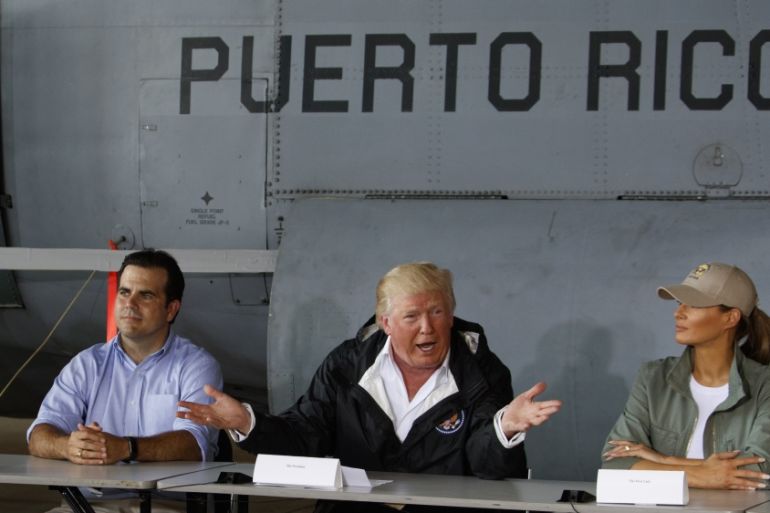Puerto Rico crisis ongoing months after Hurricane Maria
Affects of deadly hurricane still being felt as critics take Trump administration to task for failing reconstruction.

Puerto Rico remains in dire straits more than two months after Hurricane Maria slammed into the US territory, according to humanitarian organisations and US legislators.
Puerto Rico’s situation “remains quite serious and will require significant support for some time to come”, Andrew Schroeder, director of research and analysis for global medical nonprofit Direct Relief, told Al Jazeera.
Keep reading
list of 4 itemsPhotos: Dubai reels from flood chaos as record rains lash UAE
Dubai submerged in floods as UAE gets over a year’s worth of rain in hours
Heavy rains kill 18 in Oman as flash floods lash UAE
“Direct Relief is planning to continue extensive support throughout the health system for the foreseeable future,” he said.
The island, an American territory whose people are US citizens, was dealing with a debt crisis before Maria hit, devastating its power grid and water infrastructure. Puerto Rico owes creditors more than $70bn with an additional $43bn owed in pension payments.
The hurricane had sustained winds of 250km per hour when it made landfall on Puerto Rico on September 20, killing at least 55 people. Maria followed Hurricane Irma, the most powerful Caribbean hurricane on record, which grazed Puerto Rico on September 6.
Medical crisis continues
The ensuing damage, estimated to cost up to $95bn, has left Puerto Rico in a healthcare crisis.
Direct Relief has provided community medical centres with more than $300,000 and airlifted 76 tonnes of medical supplies to Puerto Rico over the past two months.
Schroeder was quick to say the crisis, along with many others, predates Maria. Before the hurricane, 73 of 78 municipalities were “medically underserved” by the US government.
Schroeder explained a number of issues have contributed to the emergency, including Puerto Rico’s debt and the “brain drain” of qualified medical practitioners leaving for the mainland United States.
“Particularly in the interior of the island, communities faced chronic underinvestment compounded by crippling public debt,” he said.
“Likewise, power and communication systems remain precarious throughout the country.”
Puerto Rico was entirely without power after Maria hit and still faces regular power outages because of the aging electrical grid.
US Senator and former presidential candidate Bernie Sanders introduced legislation on Tuesday that would set aside $146bn for reconstruction and aid in both Puerto and the US Virgin Islands, which were also battered by Maria and Irma.
Congress approved a $36bn aid package for Puerto Rico and parts of the US experiencing wildfires on October 24. The passage of that bill wasn’t guaranteed, as several conservative legislators originally voiced opposition to the measure.
The legislation, The Puerto Rico and US Virgin Islands Equitable Rebuild Act of 2017, would forgive Puerto Rico’s debt and install a new electrical grid that could withstand future hurricanes.
The act is supported by numerous Democrats in both the House of Representatives and the Senate, including Elizabeth Warren and Stacey Plaskett, the Virgin Islands’ delegate to the House of Representatives.
Sanders’ bill calls for the grid to be “rebuilt in a modern, renewable and resilient way”, setting aside $100m for renewable energy on the islands.
‘President Trump’s Katrina’
However, the White House authorised the Federal Emergency Management Agency (FEMA) to respond to the Puerto Rico crisis under the Stafford Act, which only requires pre-existing infrastructure to be reconstructed.
“The federal government needs to fund rebuilding the electricity grid in a way that makes renewable energy its cornerstone,” Judith Enck, a former Environmental Protection Agency regional administrator for District 2, which includes Puerto Rico and the Virgin Islands, told Al Jazeera in an email.
“Congress must direct FEMA to rebuild the electricity grid in a more resilient way,” Enck continued. “Climate change makes hurricanes stronger. More hurricanes will hit the Carribean and we cannot afford to have the old unreliable electricity grid put back up.”
Enck worked for the EPA from 2009 until January, leaving the agency days before Trump took office. A longtime environmental activist before taking government positions, she called the Trump administration’s handling of relief efforts in Puerto Rico “a disgrace”.
Trump has said he shouldn’t be blamed for the continuing troubles Puerto Rico faces. The US president said the territory “was in really bad shape” before the hurricanes struck.
Trump cited Puerto Rico’s debt, which many detractors blame on a 1970s US tax loophole that allowed corporations to pay little income tax if they moved factories to the US territory.
Many corporations did move to the island but have since left, impacting Puerto Rico’s economy.
Enck said Trump should be held responsible for the continuing difficulties.
“This is President Trump’s Katrina,” she concluded, referring to former President George W Bush’s slow response to the 2005 hurricane that hit New Orleans, Louisiana, which received widespread criticism.
Schroeder, meanwhile, said aid efforts should focus on “making sure that Puerto Rico’s reconstruction is sufficient to the magnitude of the problem, grounded in equitable growth, creative and forward-looking, rather than limited to replacing what existed before the storm”.